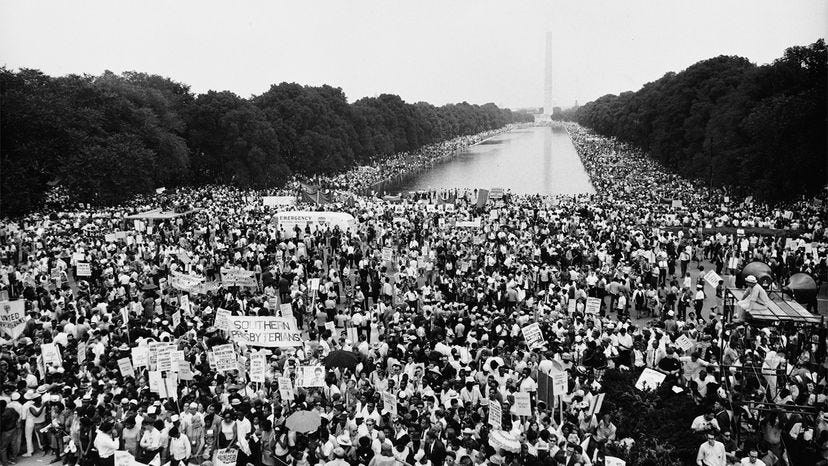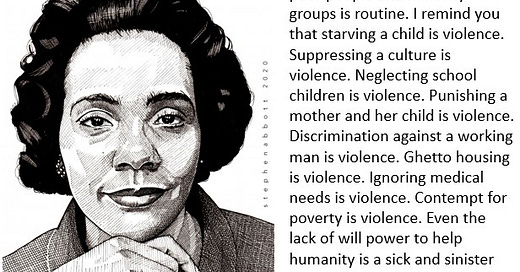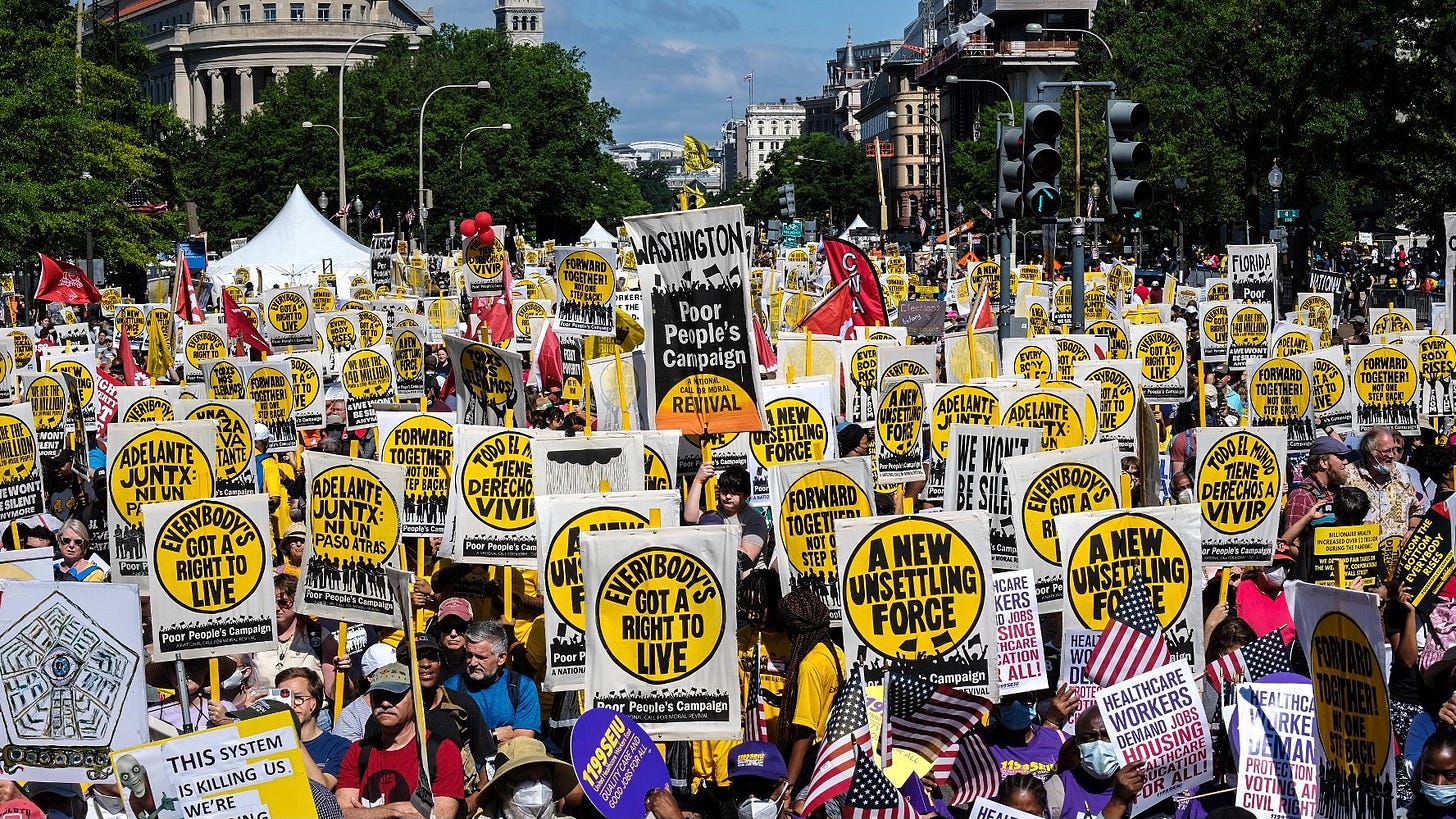On June 19, 1968, 50,000 people marched to the capital demanding economic rights. The occupation lasted forty-two days before being dispersed by police. 54-years later, on June 18, 2022, thousands again descended upon the capital insisting that the dignity and plight of poor people be addressed by the powerful.

The original Poor People’s march of 1968 was initiated by Rev. Dr. Martin Luther King, Jr. He teamed up with members of the Southern Christian Leadership Conference (SCLC) with the aim of bringing together two thousand poor people across the United States to establish an encampment at the nation’s capital. King envisioned a new march on Washington that would pressure elected officials to begin remedying the economic impoverishment that deprived African Americans and poor people of all ethnicities of lives of decency.
King was tragically murdered on April 4, 1968, one day after joining striking sanitation workers in Memphis, Tennessee who were demanding increased wages and better working conditions. King’s colleagues went through with the encampment and march. Coretta Scott King led a Mother’s Day march through poor neighborhoods in Washington D.C. on May 12, 1968. Nine days later, hundreds from across the country began arriving to help create “Resurrection City,” a self-sufficient encampment of about three thousand on the National Mall.

Immorality and Violence in Not Helping the Poor
Coretta Scott King addressed marchers, on June 19, 1968 having lost her husband just two months earlier. In her “Solidarity Rally” address, King insisted that racism, poverty, and war were interlocking evils that inflicted violence on humanity. This violence threatens “to destroy the basic fabric of which our society is woven,” namely the “undergirding fabric of love, understanding, justice and peace.”

She argued that remedying these interlocking evils required an honest confrontation with our nation’s cruel history of institutionalized racism, including the prolonged affects of slavery and segregation on generations of black people. We would also need to understand the class structure of society, recognizing that people of all ethnicities were harmed by poverty. And poverty, according to King, was capable or producing “the most deadly kind of violence.”
Understanding the harms of poverty, Coretta Scott King argued, required a deeper understanding of violence, namely the violence enabled by political policy and moral apathy.
“In this society, violence against poor people and minority groups is routine. I remind you that starving a child is violence. Suppressing a culture is violence. Neglecting school children is violence. Punishing a mother and her child is violence. Discrimination against a working man is violence. Ghetto housing is violence. Ignoring medical needs is violence. Contempt for poverty is violence. Even the lack of will power to help humanity is a sick and sinister form of violence.”
This expansive understanding of violence and insistence that food, housing, and healthcare are human rights echoes the longest-serving president in U.S. history.
Drawing on such a vision of the just society, the contemporary Poor People’s Campaign seeks to support workers’ rights by calling for increased minimum state and federal wages and an end to anti-union laws. The campaign also calls for full funding and prioritization of welfare programs for poor and low-income people in the U.S..
This expansive understanding of violence and insistence that food, housing, and healthcare are human rights echoes the political vision of the longest-serving president in U.S. history.
FDR and the Second Bill of Rights
Four-term president, Franklin Delano Roosevelt, believed genuine individual liberty requires economic justice. On January 11, 1944, Roosevelt, who led the United States in helping to defeat Nazi Germany, called for a "Second Bill of Rights.”
FDR began by noting that our republic began with a recognition of
“the right of free speech, free press, free worship, trial by jury, freedom from unreasonable searches and seizures. They were our rights to life and liberty.”
These political rights have proven inadequate with the significant changes since our nation's founding.
“We have come to a clear realization of the fact that true individual freedom cannot exist without economic security and independence. ‘Necessitous men are not free men.’ People who are hungry and out of a job are the stuff of which dictatorships are made.”
The suffering of an economically demoralized population is bad on two accounts: it deprives individuals of their nation’s promise to a true opportunity of happiness and predisposes them to embrace a demagogue and authoritarianism. In light of the rise of fascism and Nazism, Roosevelt concluded that genuine security required more than military might, it required honoring human dignity by guaranteeing economic rights.
FDR called for a Second Bill of Rights to include the right to a useful and well-paid job and freedom of businesses to compete without the domination of monopolies. He insisted that our nation’s promise of “life, liberty, and the pursuit of happiness,” also demands guaranteeing these rights:
“the right to earn enough to provide adequate food and clothing and recreation;”
“the right of every family to a decent home”
“the right to adequate medical care and the opportunity to achieve and enjoy good health”
“the right to adequate protection from the economic fears of old age, sickness, accident, and unemployment;”
“the right to a good education.”
FDR introduced these principles 16 months before World War II ended with the goal of seeing them enshrined into law after the war. He died on April 12, less than a month before Hitler committed suicide and Benito Mussolini in Italy was killed. FDR’s Second Bill of Rights was never enacted.
The Contemporary Poor People’s Campaign
On June 18, 2022, thousands from around the United States gathered to hold a poor people and low-wage workers assembly in Washington DC. The event, organized by the new Poor People’s Campaign, aimed to affirm the economic rights FDR advocated for and reignite the torch Rev. King and Coretta Scott King helped light in 1968.
The rally uniquely placed economic inequality and class at the center of concern and shared identity. Held against the backdrop of the capital, the rally featured a variety of voices rarely amplified in dominant media or political discourse: the voices of low-income people painfully impacted by poverty and a lack of vital resources such as healthcare and housing. People like Linda Burns, a Birmingham, Alabama Amazon warehouse worker who described workers being treated like robots and having their bathroom breaks timed.
“And no matter how hard I worked, no matter how hard, it was never enough.” - Pam Garrison
West Virginian, Pam Garrison took to the podium with bare hands and no written remarks. She offered poignantly testimony of living poor. Speaking in the distinctive dialect of her state, Garrison said, “I stand here as one of the 140 million poor, low wage workers. I've worked two and three jobs my whole life.” She urged those gathered to “fight like hell” for social change, and said the ethnically diverse crowd that they were “my people.”
Garrison then gave an emotive accounting of what her lifetime of low-wage labor had cost her and her family.
“I want to tell you what they stole from me—just one thing that they stole from me. They stole my motherhood. They stole my children's childhood. My children, the memories they have of me growing up—and you know everybody remembers your childhood if you don’t remember nothin’—I'm absent in my kid's memories. They remember mom always working. They don't remember me there helping homework, they don't remember me putting them to bed. Because I was trying to keep a roof over their head and food on the table and a pair of shoes on their feet.
“And no matter how hard I worked, no matter how hard, it was never enough. And now I have to live— my daughters are grown—with being absent in their minds. And that breaks my heart, it kills me. And that’s something they can’t give me back. And I don’t want anymore mothers and fathers to hear this, when your children are grown, that they don’t remember you there.”
Poor People’s Campaign co-organizer, Reverend William Barber said that participants had gathered to challenge a status-quo that permits 140 million people to be poor or teetering toward poverty in the richest nation in human history. Addressing poverty requires us to grasp the immensity of the problem. This reality is concealed not only by culturally stereotyping the poor and excluding them from dominant media forums, but also by the ways we count who is poor.
By official measures of poverty, a family of four earning $26,000 is not counted as poor. By such accounting, just 12% of the population is poor and another 18% near poor. But calculations using the supplemental poverty measure (SPM), which factors in costs of regional economic differences and essentials such as food, clothing, housing, and utilities, reveal that about 43% of the US population are poor or one small emergency away from being poor. A perusal of MIT's “Living Wage Calculator” makes it clear that most of Americans lack the resources deemed necessary for secure, dignified living.
Being poor and near poor isn’t a result of the laws of nature. It’s the result of political-economic policy choice. In 2021, the bottom 50% owned just 1.5% , which is about the same as it was during the last years of Rev. King’s life. The very poorest remain very poor, but the very wealthiest earners now take more wealth from those just above the poorest Americans. Whereas the top 1% of adults had about 25% of the wealth in the late 1960s, they now possess 34.9%. And the richest 10% of the population owned 70.7% of all wealth.
Despite increases in profits earned from workers’ labor, 43.7% of workers in the U.S., according Oxfam, earned less than $15 an hour in 2021. More than 50% of black workers and 60% of Hispanic workers earn under $15-an hour. For those working 40-hour work weeks, that’s $600 a week, $2,600 a month, and $31,200 per year. A third of U.S. workers earn less than $12 an hour. In Florida 50.1% of workers made less than $15 an hour and 35.8% made less than $12. Meanwhile the average cost of rent ranges from more than $1,700 a month in Jacksonville to more than $2,000 in Tampa and the Miami-Fort Lauderdale area. Housing-rights advocates are calling on the U.S. government to address skyrocketing rental rates.

Expanding on Rev. King’s contention that injustice stems from militarism, poverty, and racism, Barber said that today’s ignored underclass are
“entangled in the unjust weed of poverty, and bound up by the interlocking realities of systemic racism, voter suppression, refusal to pay a living minimum wage, bad tax policy, ecological devastation, denial of health care, inequitable educational opportunities, the war economy, and the false moral narrative of religious nationalism.”

Read the related post, “Death by Poverty: The Lie of Scarcity and the Risk of Spiritual Decline”
Rev. Barber called on those in power to acknowledge what FDR had recognized: the lethality of poverty. One study determined about 4.5% of annual U.S. deaths—hundreds of thousands—are attributable to poverty. Barber pointed to a study that concluded more than 25% of U.S. Covid-19 deaths could have been avoided with universal healthcare. Researchers estimated that more than 300,000 Covid-19 deaths were linked to insufficient healthcare resources due either to lacking health insurance or being under-insured.
Echoing Coretta Scott King’s expanded conception of violence, Barber insisted that policy choices that come at the expense of human life is as reprehensible as it is unsustainable.
“This level of poverty and greed in this, the richest nation in the history of the world, constitutes a moral crisis and a fundamental failure of the policies of greed. These numbers and interlocking injustices are not just about debates between right and left and moderate. No, this language and categories are too puny for what we face. They represent a crisis of democracy, a shared failure to center poor and low-wealth people; the very people who are the greatest moral leaders and survivors in our society, and the true bellwether of our well-being.”
By failing to address economic inequality and the suffering born of disempowerment and poverty, we permit dangerous and destabilizing social and ideological pathologies to grow and spread. Pathologies that may well threaten our democracy as FDR warned. Now is the time to seriously contemplate the ideas and insights of Coretta Scott King, MLK, and FDR. We would also do well to remember that the poor and near poor are, indeed, our people.
Please share and like this post by clicking the heart icon.
Invite Dr. Nall to Speak
Dr. Nall delivers energetic live presentations and engaging workshops on the subjects featured in Humanities in Revolt. Those interested in booking a workshop or talk can get in touch through Facebook or by leaving a comment.










Our whole economic system is based on the competitive model, which is actually not in tune with human nature or human needs. It thus produces a sick society, bereft of humane qualities like kindness, sharing and cooperation. Racism, poverty and violence will always be a part of competitive capitalism.